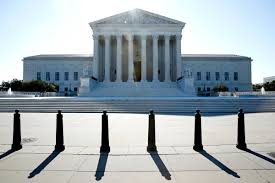
When Loper Bright Enterprises v. Raimondo overturned the longstanding 1984 deference case, Chevron, in June 2024, tax lawyers across the country began to question what a post-deference world would look like in their state. Some attorneys worried about conformity issues. Others worried about the changes taxing authorities would put in place to make the lives of taxpayers and their representatives more difficult going forward. But down here in Florida, we have had a constitutional prohibition against deference in place since 2019.
Article V, Section 21, of the Florida Constitution was enacted in 2019:
Judicial interpretation of statutes and rules.—In interpreting a state statute or rule, a state court or an officer hearing an administrative action pursuant to general law may not defer to an administrative agency’s interpretation of such statute or rule, and must instead interpret such statute or rule de novo.
Prior to the 2018 constitutional amendment passing with over 60% of the vote, concerns were expressed over deference in the state and what a prohibition would potentially provide.
ALJ John G. Van Laningham wrote an article expressing both his concerns with deference in general and as applied to Florida. In “When Courts Bow to Bureaucrats: How Florida’s Deference Doctrine Lets Agencies Say What the Law Is,” he evaluated Judicial and ALJ Deference to Agency Interpretations and Fact-Finding.
“I am not a fan of the deference doctrine,” he admits. “Having served as an ALJ for the better part of my professional career, I have seen at close range the fearsome power of the administrative state. It is worrisome that the same hand which writes the law’s interpretation can also sign an administrative complaint based on that interpretation and, later, execute a final order enforcing that interpretation.”
He also addressed the problematic application of agency deference to tax statutes when they are to be construed narrowly against the agency. The Florida Supreme Court was clear on the issue in Maas Bros., Inc. v. Dickinson:
“Tax laws are to be construed strongly in favor of the taxpayer and against the government, and that all ambiguities or doubts are to be resolved in favor of the taxpayer.”
For all the problems with deference, however, ALJ Van Laningham anticipated that a Florida constitutional prohibition on deference would not fix all problems. Agencies would still be able to construe ambiguous statutes but would be forced to do so in compliance with the APA. In Florida, these agencies would be required to express their position through the public rulemaking process because there would be no deference given to a mere interpretation.
By January 2020, the Florida Bar Journal published “The Demise of Agency Deference: Florida Takes the Lead.” The authors concluded that courts of all levels were recognizing the constitutional change and “the abolition was well on its way to becoming well-ensconced in the courts and administrative bodies of this state.”
Since Loper Bright, tax practitioners across the country have expressed concerns that taxing authorities will no longer provide guidance, leaving taxpayers in the dark. After all, without deference, why would an agency bother to issue guidance with an interpretation that carries no weight in the courts? Taxpayer advocates are concerned over how they will assist clients who either exist or operate within a “gray area” of state tax.
As we approach the end of 2024, this Florida state and local tax attorney finds these concerns legitimate but for a different reason. We love guidance because it makes our job easier. But is the guidance provided by DOR ever taxpayer-friendly? We don’t need formal guidance to know that DOR will almost always “interpret” statutes in the most aggressive way possible. What appears to be underestimated is the extent to which DOR needs internal guidance.
If a tax law is ambiguous, how can a Florida business be expected to perfectly implement it when DOR cannot even do so? In short – if a “guidance” is needed, there is a problem in the statute or rule. These issues of ambiguity are supposed to be resolved in favor of taxpayers in the courts. However, in practice, when an aggressive taxing authority with a high turnover of auditors is trying to issue rapid-fire assessments against businesses operating in Florida, these auditors are not trained or experienced in “gray areas” and it is DOR that is desperate for a solution.
Unfortunately, the constitutional prohibition on agency deference has driven agency interpretations underground in Florida. Most taxpayers will never know if they are victim to an agency interpretation that has not gone through formal rulemaking. State and local tax lawyers in other states who are hopeful their state taxing authorities will refrain from secret policies through the public rulemaking process may be disappointed.
In Florida, the Department of Revenue routinely issues “secret” guidance letters, such as Internal Technical Advisements (“ITA”) which keep their interpretations hidden while applying them. If deference were available in the courts to agencies like DOR, they would likely have no concern in expressing their interpretations transparently. However, DOR auditors need guidance and any interpretation which is not properly adopted will be given no deference. Rather than admitting to their interpretations, the Florida Department of Revenue avoids the deference question by applying their interpretations in secret. Taxpayers challenging an agency interpretation now have the additional burden of proving it exists in the first place.

Jeanette Moffa, Esq.
Phone: (954) 800-4138
Email: JeanetteMoffa@MoffaTaxLaw.com
Jeanette Moffa is a Partner in the Fort Lauderdale office of Moffa, Sutton, & Donnini. She focuses her practice in Florida state and local tax. Jeanette provides SALT planning and consulting as part of her practice, addressing issues such as nexus and taxability, including exemptions, inclusions, and exclusions of transactions from the tax base. In addition, Jeanette practices Florida tax controversy, working with state and local agencies in resolution of assessment and refund cases. She also litigates state and local tax and administrative law issues at the trial and appellate level.



